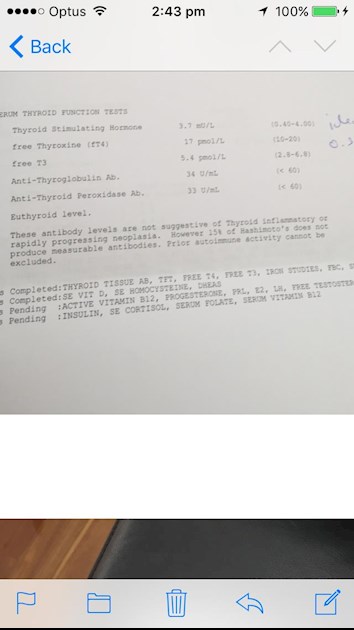Blood results on 2 grains NDT
Advice ?

Blood results on 2 grains NDT
Advice ?
That's a very strange rT3 range. In any case, it's not over-range, so I shouldn't worry about it. Your FT4 is not high enough to cause high rT3. Your FT3 is good. But, room for an increase in dose if you feel the need.
Really? Doc seems to think it's high? Feeling still very tired and acne getting worse Had Iron infusion about 4 weeks ago so maybe need another to get levels up Thanks for reply
I very much doubt your doctor knows anything about rT3. It's high in range, but still in-range. But, if he thinks it's high, what is he proposing to do about it?
There are many causes of high rT3, and that's the problem with the test : it tells you if there's a problem, but doesn't tell you where it is. If you're taking NDT, it's very rare for high rT3 to be caused by the FT4 level. So, how is he going to find out what's causing it? Has he tested your iron? Your cortisol? Asked you how many calories you're eating? Checked to see if you have an infection? I sincerely think he may just have said that for something to say. To look like he knew what he was talking about. 
Yes totally agree Just so sick of trying to find answers 👍
Doctors know little and only go by numbers in the ranges. Blood tests were invented for levothyroxine (T4 only) therefore tests cannot correlate if we add T3 or take NDT.
If we take levothyroxine alone which is an inactive hormone it has to convert to the Active Hormone T3. It is T3 which runs our whole metabolism.
Your rT3 is 92% in its range, but your fT3 is only 67%. Your doctor is correct, rT3 is relatively high. You may benefit from reducing your NDT and adding T3. And addressing the conversion issues of course, but sometimes you never get to the bottom of why conversion is not good.
Thanks yes I was going to ask if can add T3 into the mix
Thanks for reply ✔️
PS - If your doctor didn't know anything about rT3 then he/she really wouldn't have even known to test for it. Here is an interesting article:
nahypothyroidism.org/thyroi...
Notice that it highlights the importance of the fT3/rT3 ratio in accessing tissue hypothyroidism.
"A high reverse T3 can be associated with hyperthyroidism as the body tries to reduce cellular thyroid levels, but this can be differentiated by symptoms and by utilizing the free T3/reverse T3 ratio, which is proving to be the best physiologic marker of intracellular thyroid levels."
"The intracellular T3 deficiency seen with these conditions often results in a vicious cycle of worsening symptoms that usually goes untreated because standard thyroid tests look normal. Additionally, it is not surprising that T4 preparations are generally ineffective in the presence of such conditions, while T3 replacement is shown to be beneficial, with potentially dramatic results (71,74,75,76,80,81,82,86,97,98,99,100,101,102,103,104,105,173-198). In the presence of such conditions, it should be understood that significant intracellular hypothyroidism may exist that remains undiagnosed by standard blood tests (the freeT3/reverse T3 ratio may aid in the diagnosis). Thus, more appropriated testing beyond standard thyroid function tests should be considered and supplementation with T3 should be considered with such patients."
This is an excerpt from a doctor who was also a scientist and researcher re RT3. He was also an Adviser to Thyroiduk.org.uk before his death:-
A popular belief nowadays (proposed by Dr. Dennis Wilson) has not been proven to be true, and much scientific evidence tips the scales in the "false" direction with regard to this idea. The belief is that the process involving impaired T4 to T3 conversion with increases in reverse-T3 becomes stuck. The "stuck" conversion is supposed to cause chronic low T3 levels and chronically slowed metabolism. Some have speculated that the elevated reverse-T3 is the culprit, continually blocking the conversion of T4 to T3 as a competitive substrate for the 5’-deiodinase enzyme. However, this belief is contradicted by studies of the dynamics of T4 to T3 conversion and T4 to reverse-T3 conversion. Laboratory studies have shown that when factors such as increased cortisol levels cause a decrease in T4 to T3 conversion and an increase in T4 to reverse-T3 conversion, the shift in the percentages of T3 and reverse-T3 produced is only temporary.
To answer your question: In a 1994 article, I did write of my testing of fibromyalgia patients for laboratory evidence of elevated reverse-T3. [Lowe, J.C., Eichelberger, J., Manso, G., and Peterson, K.: Improvement in euthyroid fibromyalgia patients treated with T3. J. Myofascial Ther.,1(2):16-29, 1994.] During one year, I tested 50 fibromyalgia patients to see if they had laboratory values that would suggest that they had impaired conversion of T4 to T3 with elevated reverse-T3. I've also tested other patients since 1994. However, I have not found laboratory evidence of impaired T4 to T3 conversion in a single patient.